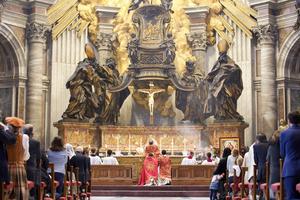A Convert Considers the Joy of Catholic Rules
Having a rule, even if it’s not closely defined, is a great gift.

I arrived just seven minutes late, but the priest was already preaching. My wife wasn’t well that morning, but wanted to get to Mass later if she felt better, and that evening I waited until the last moment to leave home. They must have shot through the beginning of the Mass, because from past experience I expected to get there in time for the Gospel, and therefore be able to receive Communion.
I had been told as an Episcopalian that you had to hear the Gospel to receive Communion, because you should hear Jesus speak if you wanted to meet him in sacrament, which made me sense to me, and was a useful rule, as someone who often runs late.
I recently found that Catholic theologians and canon lawyers avoid giving a definite point at which the latecomer should stay in his pew when everyone else goes up to receive Our Lord. But they imply a rule, and, if anything, it’s a stricter one. They don’t allow you to show up any time and go forward. We need some rule because we must obey another one: We must go to Mass on Sundays and other holy days of obligation, unless we really can’t or shouldn’t.
I really appreciate having a rule, even if it’s not closely defined. Many Catholics I know don’t. They grew up with too many rules, some of them really bizarre, and have had enough rules for a lifetime, thank you very much — which I understand. It’s hard to escape one’s childhood formation. The Church has other gifts for them.
I had a different experience. Making my way to Christianity from nothing much as a child, knowing mostly evangelical Christians, and then to the Episcopal church, much of that time working at an evangelical Episcopal seminary, I experienced a different kind of piety. It left me wanting what some of my Catholic friends wanted to leave behind.
The forms of Protestantism I experienced required me to do the right things, not always very well defined, and to feel the right ways — because everything was supposedly a matter of the heart. Protestants objected to Catholic practice because it was “legalistic” and “juridical” and supposedly let you avoid a true “heart religion.”
Trying to live this way could be exhausting. Was I doing the right thing? Did I feel the right way about it? Was I acting from the heart or just following the rules? Was I listening to the Spirit or doing what I wanted? Who could possibly tell? And I didn’t find this nearly as difficult as many people I knew, who tied themselves up in knots trying to know they truly loved God.
I didn’t trust my discernment of my own heart, and I had reason not to trust others’ discernment of their hearts. I didn’t trust many of the people who were so sure they were doing the right thing and felt the right way about it. Some were leading figures in their worlds widely admired for their faith, but I had seen enough behind the scenes not to share the admiration. In the kind of piety the belief in feelings created lay lots of room for deception, of self and others. If I could see that others fooled themselves, I had to assume that I could be fooling myself as well.
On top of which, there was an irony in how many people who preached this piety still found they needed to find rules for living it out. Colleagues at the seminary who sneered at Catholic “casuistry” would find themselves practicing a rough form of it when they had to decide how to settle some practical question of human, particularly student, behavior.
They would, for example, have corrected a student who arrived at the weekly seminary service just as everyone started going forward for Communion and slid into the back of the line. When he objected, as he would, they would have found themselves trying to find some rule that excluded what he had done. That weekly service was, by the way, required, that is, a Protestant holy day of obligation. The faculty didn’t object to that rule.
To me, the Catholic Church with her fairly minimal rules combined with the provision of confession appeared as a deliverance. Yes, you were supposed to love the Lord with all your heart, but while you’re learning to do that, here are the things to do. They were like the steps painted on the floor of an old-fashioned dance studio. Until you learned to dance, you put your feet on them.
By doing that, you began to learn to dance, until you would put your feet in the same places without looking because you knew the dance. When you stepped in the wrong places, or on your partner’s feet, or fell down, the instructor told you it was okay and helped you get better.
Many people who grew up with too many rules don’t find them helpful. For me, who didn’t, the Church’s rules — informal and formal — make the Christian life easier. They give me something to do, something on which I can make progress, something that in a rough way points me to holiness.
- Keywords:
- catholic mass
- holy communion
- conversions

















